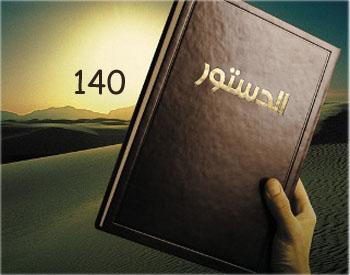 I harbour no sympathy for the calls to reopen the file of constitutional amendments. It would disrespect the Constitution, which was amended as late as 2007, to reconsider it every now and then for no urgent reason. If some politicians and pundits have aspirations to introduce fundamental changes to the Constitution, they need to exert serious effort to convince the public of their cause. Moreover, they should wait until the time is ripe for such a move. Constitutional amendments should by no means serve the purpose of legislative or presidential elections.
I harbour no sympathy for the calls to reopen the file of constitutional amendments. It would disrespect the Constitution, which was amended as late as 2007, to reconsider it every now and then for no urgent reason. If some politicians and pundits have aspirations to introduce fundamental changes to the Constitution, they need to exert serious effort to convince the public of their cause. Moreover, they should wait until the time is ripe for such a move. Constitutional amendments should by no means serve the purpose of legislative or presidential elections.
In search of a fair game
Youseef Sidhom
Opinion
23:09
Sunday ,05 September 2010

In this respect it has to be acknowledged that a number of measures which govern our electoral process need to be reconsidered if the democratic principles stipulated by the Constitution are to be upheld.
With the looming elections for the People’s Assembly (PA), the lower house of Egypt’s Parliament, the impartiality of the PA speaker in relation to the different political parties, and the ruling National Democratic Party (NDP) in particular, cannot be sufficiently underscored. Many were the occasions when MP variance and dissent led to explosive situations in the PA, were it not for the intervention of the PA speaker to contain the crisis. Hence the role of the speaker as a safety valve that preserves the stability of the system. And even though many would argue that Dr Fathi Sorour—PA speaker since 1990—has invariably clung to impartiality while performing his role, the principle itself should be consolidated to guarantee that the PA leadership would not misuse its power to serve the interest of any given party.
Since the speaker and his two deputies are elected by the PA, I believe the three have to relinquish their party membership once elected; they can resume membership to their parties once they leave their posts. Otherwise, the speaker and his deputies may be elected from among the independent MPs.
Another widespread parliamentary phenomenon that begs reconsideration is that of the MP/minister or minster/MP. I agree with the opinion lately expressed by Al-Ahram columnist Abdullah Abdel-Salam: “the MP/minister is well-know in the outside world, but we in Egypt misinterpret it. The minister there does not become an MP, but the other way round; politicians advance their career step by step. The beginning could be party activities or municipal elections. Then one becomes an MP before being chosen as cabinet minister”. The situation here is exactly the opposite. Once nomination is open, we see most NDP ministers rushing to nominate themselves as PA candidates. This constitutes a blatant violation of democratic principles. First, it goes without saying that when cabinet ministers run for elections, they have far more resources and authority at their fingertips—including offering voters services with the aim of luring their vote—than is available to other candidates. This practically deals a severe blow to the principle of equal opportunity. Second, whatever happened to the separation of authorities stipulated by the Constitution and repeatedly stressed by officials? How can a minister committed to the executive authority perform a legislative and regulatory role? By accepting this matter of fact, we undermine a major democratic principle and create an overlap between two authorities. This works to the detriment of the performance of the PA itself; a number of influential MPs are torn between their executive and legislative commitments.
We thus need to consider setting a new rule stipulating the resignation of government officials if they decide to run for Parliament. Such a move would establish a respectful tradition in Egyptian political life and put us in the right direction without the need to amend the Constitution.
Even a casual observer of the electoral processes in Egypt will not fail to see the dominant influence of money and family connections as opposed to political programmes and long-term strategies. Those who suffer abject poverty realise that their votes are a precious commodity traded only in electoral seasons. Given the miserable life they lead, they have no scruples with selling their votes in return for a price. With this in mind, we need to move decisively to turn the electoral process into a fair game.



